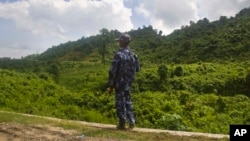Reports are emerging of new atrocity crimes being committed in a concerted campaign of violence and destruction by Myanmar’s military against the largely Muslim Rohingya people in northern Rakhine state.
“We are receiving frightening and disturbing reports from northern Rakhine state in Myanmar of the impacts of the conflict on civilian lives and property,” Liz Throssell, spokesperson for the U.N. High Commissioner for Human Rights, said Friday in a briefing to journalists in Geneva.
“Some of the most serious allegations concern incidents of killing of Rohingya civilians and the burning of their property,” she said, noting that tens of thousands of civilians have been displaced in recent days by fighting in Buthidaung and Maungdaw townships.
She said that information gathered in testimony from victims, eyewitnesses, satellite images, and online video and pictures over the last week indicate that “Buthidaung town has been largely burned.”
“We have received information indicating that the burning started on 17 May, two days after the military had retreated from the town and the Arakan Army claimed to have taken full control,” she said.
Speaking in Bangkok, James Rodehaver, head of Myanmar Team, Office of the High Commissioner for Human Rights, said his team had spoken to many sources on the ground and reviewed numerous materials, many of which “were deemed to be credible.”
“Our offices are corroborating information further, particularly in establishing who were the perpetrators of the burning.
“One survivor described seeing dozens of dead bodies as he fled the town. Another survivor said that he was among a group of displaced persons numbering in the tens of thousands, who attempted to move outside of the town to safety but were blocked by the Arakan Army,” Rodehaver said, pointing out that the Arakan Army had abused survivors and extorted money from them as they fled the town.
The Arakan Army is an armed ethnic group fighting as part of an alliance against the Myanmar military.
Rodehaver said, “In the weeks leading up to the burning of Buthidaung, the Myanmar team of the U.N. human rights offices has documented renewed attacks on Rohingya civilians by both the Arakan Army and by the military in northern Rakhine state,” including many by aerial strikes and drones.
He said his office also has received reports of shooting at unarmed fleeing villagers, multiple disappearances and burnings of homes, and has confirmed four cases of beheadings.
Rodehaver said the military has been actively targeting the Rohingya for years and has “actively enforced draconian and discriminatory restrictions affecting all aspects of their lives.”
“It is one of the reasons why the Rohingya, whenever they were asked to leave Buthidaung and other villages, have been very reluctant to move because they have needed special permission to move outside of their township of residence. They also have nowhere else to go.
“They, of course, have learned very hard lessons in 2017, knowing that whenever movement starts, it usually ends [with] them leaving their homes, never to see them again,” he said.
In August 2017, more than a million Rohingya fled to Cox’s Bazaar in Bangladesh to escape violence and persecution in Myanmar. Currently, an estimated 600,000 Rohingya live in Rakhine state. Although they have lived in Myanmar for generations, the government considers them illegal immigrants from Bangladesh and refuses to grant them citizenship.
The Myanmar junta, which has been at war with its people for decades, recently has suffered many defeats. One consequence is young men have been conscripted from the Rohingya to fight its battles, by promising them many benefits, such as more food rations for their families and a promise of citizenship.
Rodehaver calls that an insidious ploy by military leaders.
“They know that most of these men have never had any sort of combat training or self-defense training. So, they are largely being sent to the front lines as human shields or as cannon fodder, and the military knows that very well.
“The military also told the Rohingya, if you run away and you do not serve, we will arrest you or cut the rations to your family. So, they use a variety of pressures to convince the Rohingya to join. We have had reports that from 1,500 to 2,000 men have been recruited at this point,” he said.
Tom Andrews, the U.N. special rapporteur on the human rights situation in Myanmar, warned Thursday of “ominous signs of another Rohingya bloodbath in Rakhine state” if the international community were to continue to turn a blind eye and fail to take action to save the lives of thousands of Rohingya.
“Once again, the world seems to be failing a desperate people in their hour of peril, while a hate-driven unnatural disaster unfolds in real time in Myanmar’s Rakhine state,” he said.
Mirroring that assessment, U.N. human rights chief Volker Türk is calling for “an immediate end to the violence, and for all civilians to be protected without any distinction based on identity.
“Prompt and unhindered humanitarian relief must be allowed to flow, and all parties must comply fully and unconditionally with international law,” he said.





